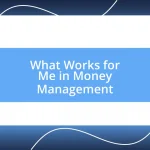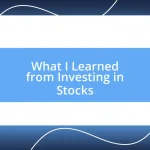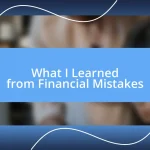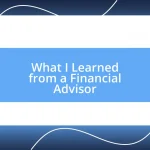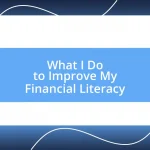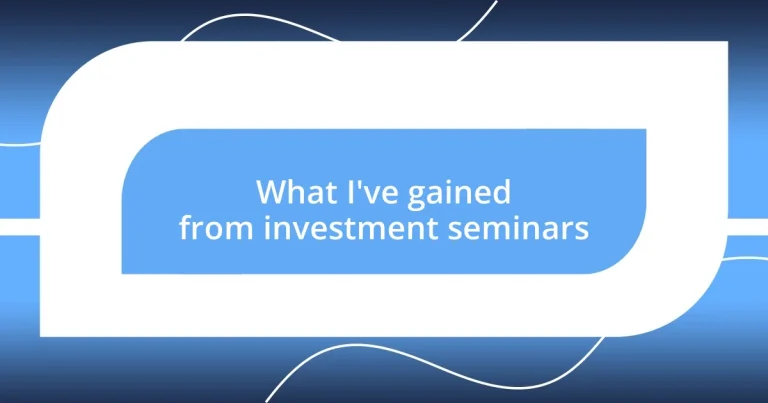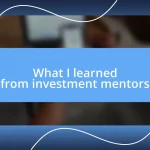Key takeaways:
- Investment seminars foster a sense of community, allowing participants to share experiences and overcome common fears about investing.
- Key skills learned include market trend analysis, risk assessment, and effective communication, which empower attendees to make informed investment decisions.
- Continuing education post-seminars, through revisiting materials and engaging in advanced courses, enhances understanding and keeps investment strategies current.
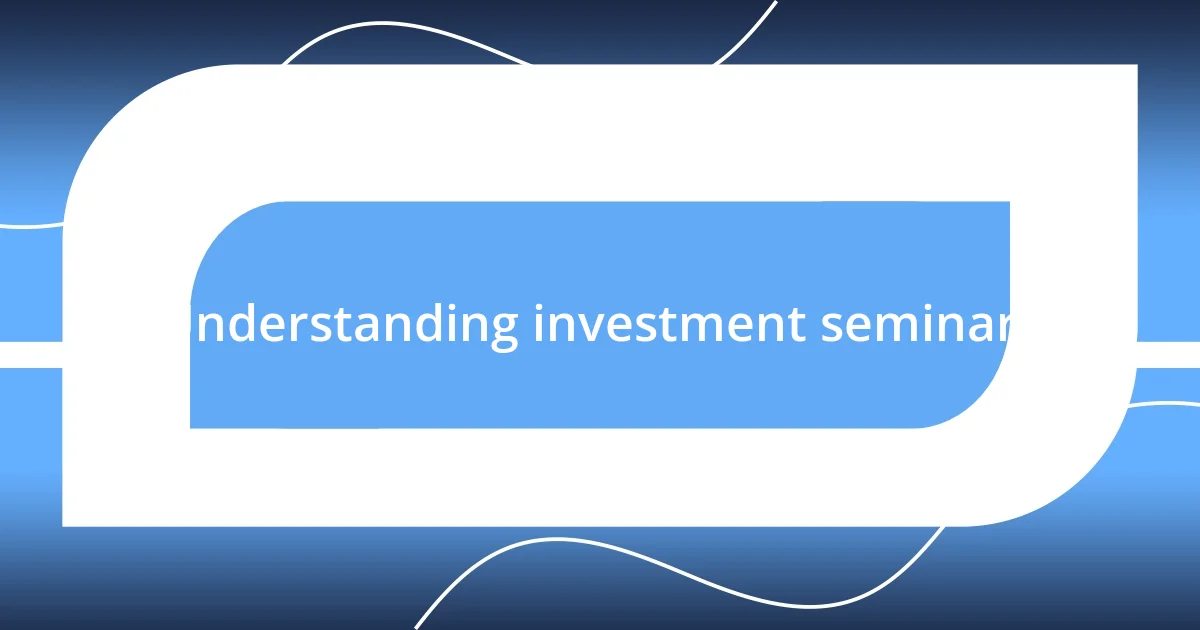
Understanding investment seminars
Investment seminars are designed to demystify the world of finance, providing attendees with insights into market trends and investment strategies. I remember my first seminar vividly—it was overwhelming yet exciting. I went in with a novice mindset, grappling with concepts like diversification and asset allocation, and walked out feeling empowered and eager to learn more.
What struck me most was the sense of community. Sharing experiences with fellow participants led me to realize that many of us were navigating the same fears and uncertainties about investing. Have you ever felt isolated in your financial journey? I often found myself surrounded by people who, just like me, were craving knowledge and confidence in managing their money better.
The speakers at these seminars often share their own journeys, which can be incredibly inspiring. I recall a moment when one of the financial experts spoke candidly about his early mistakes—he turned what could have been a discouraging tale into a lesson on resilience. It made me wonder: how many of us let fear of failure hold us back from starting our investment journey? That realization has been key in shaping my approach to investing.
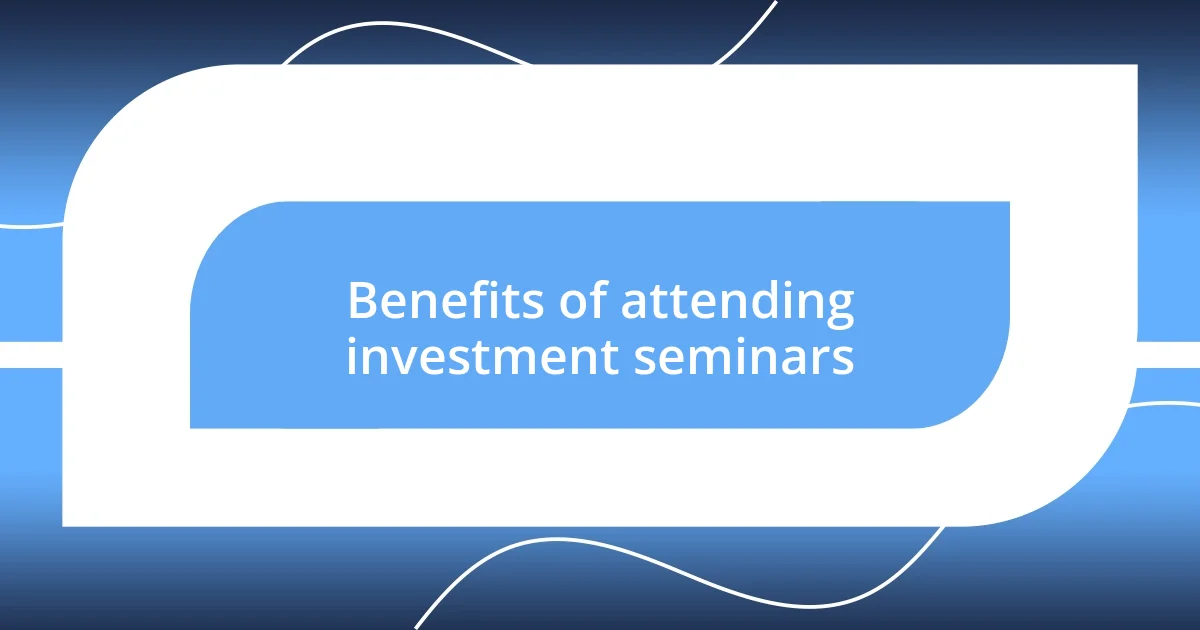
Benefits of attending investment seminars
One of the biggest benefits I’ve experienced from attending investment seminars is the wealth of knowledge provided directly by experts. There’s something incredibly reassuring about hearing strategies and advice from seasoned investors. I remember a particular session where an expert broke down complex charts into simple terms, making me feel like I could finally understand what was happening in the markets. That lightbulb moment not only boosted my confidence but also altered the way I approach my own investment decisions.
Here are a few benefits that stand out to me:
- Access to Expert Insights: Seminars often feature industry leaders who share their expertise and experiences.
- Networking Opportunities: Connecting with like-minded individuals can lead to long-lasting relationships and collaboration.
- Variety of Perspectives: Exposure to different investment styles and strategies can broaden your approach and enhance decision-making.
- Motivation and Inspiration: Hearing success stories can ignite your passion for investing and push you to take action.
- Updated Market Trends: Staying informed about the latest trends helps you make educated investment choices in a rapidly changing landscape.
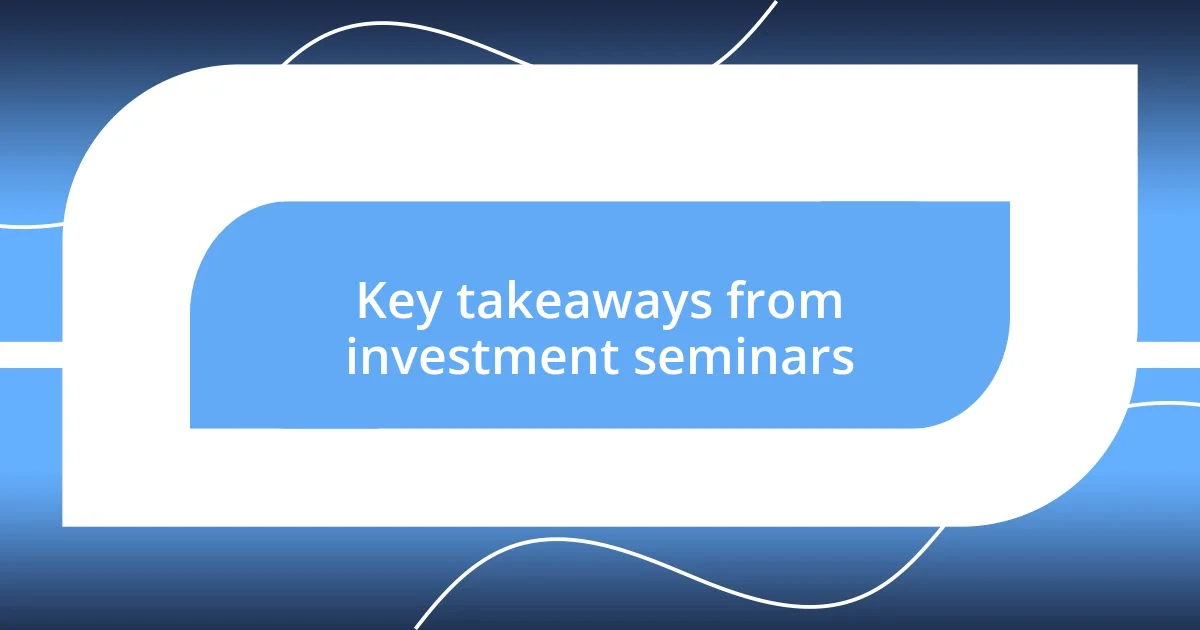
Key takeaways from investment seminars
One of the most valuable aspects of investment seminars for me has been the clear and structured breakdown of complex topics. For instance, during one session, the speaker explained the risk-return spectrum using simple analogies. It felt like a light bulb went on in my head. I realized that understanding the risk associated with various investments isn’t just for seasoned investors—it’s crucial for anyone looking to grow their wealth.
Another takeaway I often reflect on is the importance of setting clear financial goals. I remember a workshop where attendees were guided through a goal-setting exercise. It was enlightening to see how many different aspirations people had, from saving for retirement to funding a child’s education. It made me appreciate the diversity in our financial journeys. Have you ever thought about what drives your investments? For me, defining my goals has provided a sense of direction and motivation.
Lastly, something that often resonates with me is the emphasis on continuous learning. Many speakers share that investment strategies evolve, and so should we. I can recall a panel discussion where one expert emphasized that it’s okay to reassess and adjust your approach as you gain more knowledge and experience. This idea has stuck with me—adaptability is just as important as initial understanding in the world of investing.
| Key Takeaways | Description |
|---|---|
| Understanding Risk | Clear explanations make it easier to grasp the complexities of the risk-return relationship. |
| Financial Goal Setting | Engaging exercises help clarify personal investment motivations and objectives. |
| Continuous Learning | Encouragement to adapt strategies as knowledge and experiences evolve. |
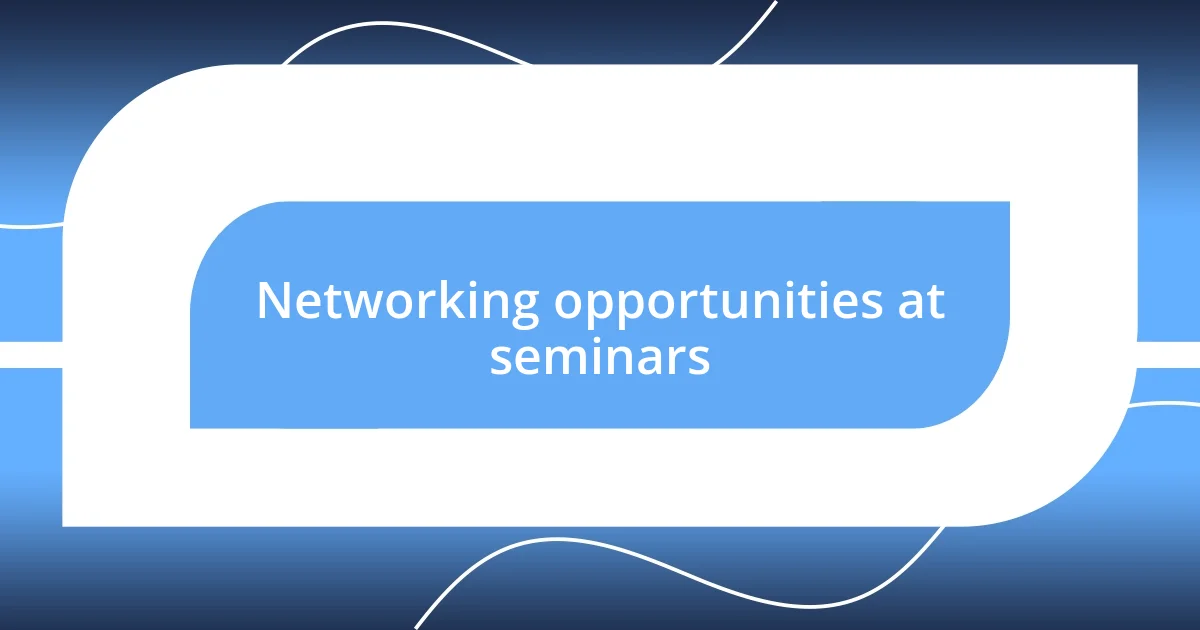
Networking opportunities at seminars
Attending investment seminars has opened the door to invaluable networking opportunities that I never anticipated. During one particular seminar, I struck up a conversation with someone who later became a mentor. This unexpected connection led to insightful discussions and even collaborative projects that shaped my investment approach. Have you ever met someone in a seemingly random setting who ended up playing a significant role in your journey? For me, these chance encounters have been transformative.
Another aspect I cherish about networking at seminars is the variety of backgrounds and experiences people bring. I recall chatting with an enthusiastic retiree who had delved into real estate investing after leaving the corporate world. His stories inspired me, and we exchanged contact information to continue our dialogue. It struck me how every person I met had a unique investment story that could offer new perspectives. It’s amazing how much we can learn from each other, isn’t it?
Lastly, the informal atmosphere at these seminars fosters genuine connections. I remember enjoying a coffee break where I met a fellow attendee who was just as passionate about sustainable investing as I was. It felt like finding a kindred spirit in a world that can sometimes seem isolating. There’s something comforting about sharing ideas and challenges with others who truly understand the highs and lows of the investing journey. These moments of connection are not just beneficial; they are essential for growth and inspiration.

Practical skills learned at seminars
One practical skill I’ve gained from attending investment seminars is the ability to analyze market trends. I remember attending a session where the speaker skillfully dissected recent economic data and its implications for various asset classes. It was like watching a puzzle come together. Suddenly, I found myself confident in connecting the dots between news headlines and their effects on my investment choices. Have you ever felt the thrill of understanding market dynamics? For me, that realization was empowering.
Another significant skill I’ve cultivated is the art of risk assessment. In one interactive workshop, we were tasked with evaluating different investment scenarios, and it became clear how each decision carries its own set of risks. Participating in group discussions about our analyses illuminated various viewpoints I hadn’t considered before. I often wonder—how many of us truly pause to reflect on the risks we’re willing to take? Gaining this insight not only sharpened my analytical skills but also deepened my understanding of my own comfort levels with various investments.
Communication skills are another unexpected benefit I’ve taken away. In seminars, we often break into small groups to share ideas and strategies. I can’t forget one time when I was encouraged to present my thoughts on a particular investment thesis to my peers. The constructive feedback I received not only boosted my confidence but also taught me the value of articulating my ideas clearly. Have you ever hesitated to share your thoughts because you weren’t sure how they’d be received? This experience taught me that effective communication can spark meaningful conversations and even lead to collaboration.

Applying knowledge from seminars
Applying the knowledge gained from investment seminars has been a transformative journey for me. I remember sitting in a workshop focused on portfolio diversification, where a well-respected speaker emphasized the importance of not putting all your eggs in one basket. This idea resonated deeply, prompting me to analyze my own investment choices. Now, when I assess my portfolio, I consciously ask myself, “Am I overly concentrated in any area?” This simple, yet powerful question has changed how I approach investing.
One of the key takeaways from a recent seminar was the concept of emotional intelligence in investing. I participated in a case study that examined how feelings can influence financial decisions. It struck me how often I’ve let fear dictate my choices during market downturns. Now, I make it a point to pair my rational analysis with an awareness of my emotions. I often reflect on this: how can we make better decisions if we aren’t in touch with our feelings? Acknowledging my emotional responses has allowed me to navigate my investments with greater clarity and confidence.
Furthermore, I’ve become more proactive in implementing strategies discussed during these sessions. For instance, after learning about the benefits of dollar-cost averaging, I decided to automate my investment contributions, resulting in a more disciplined approach. It felt liberating to take that step, as if I was finally applying the lessons learned rather than just storing them away. How empowering is it to see your knowledge translate into action? In my experience, taking those concepts and putting them into practice has made the most significant impact on my investment journey.
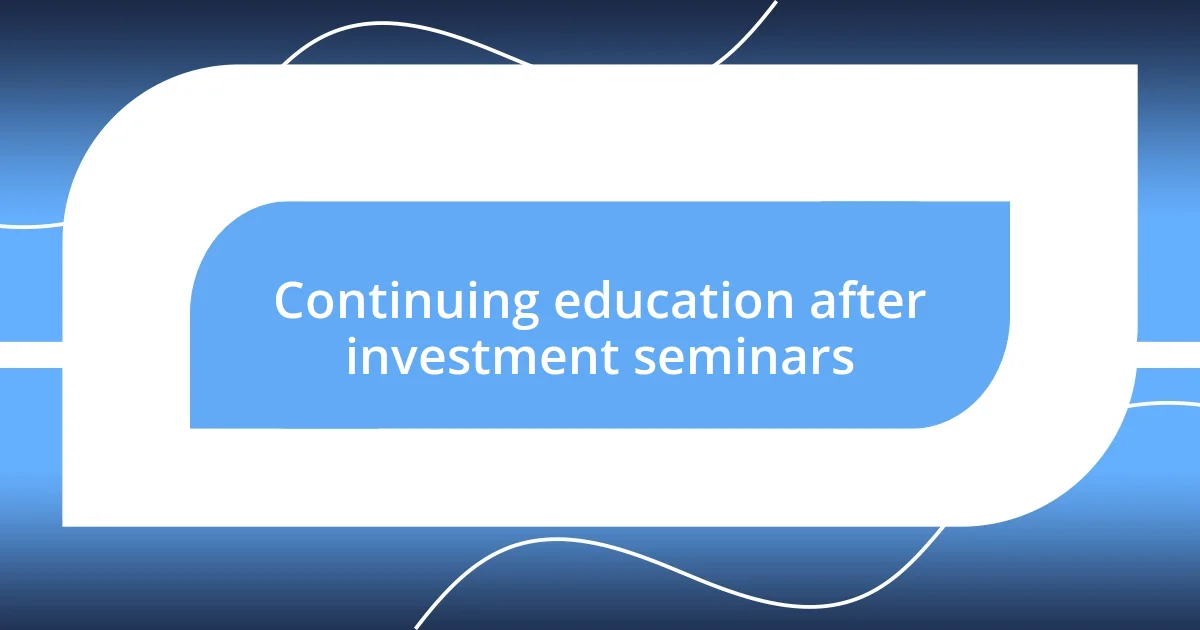
Continuing education after investment seminars
Continuing education after investment seminars is crucial for maintaining and enhancing the skills we’ve acquired. I’ve found that revisiting seminar materials is like rediscovering a favorite book; I keep spotting new insights that I missed the first time around. Have you ever had that experience where revisiting familiar content reveals something entirely new? It’s a reminder of the dynamic nature of investing and the importance of staying current.
I also enjoy participating in online forums and discussion groups that focus on investment strategies. Just recently, I came across a community where members share their real-time experiences with various investment tools. Engaging in these conversations opened my eyes to methods I hadn’t considered. It’s fascinating how collective knowledge can lead to personal growth—do you ever feel like learning from others can accelerate your understanding? Those shared insights can offer practical perspectives that enhance our ability to navigate the market.
Additionally, I make it a point to enroll in advanced courses periodically. After attending an investment seminar on alternative assets, I felt inspired to delve deeper into that area. So, I signed up for an online course specifically focused on cryptocurrencies and real estate investment trusts (REITs). The excitement of learning something new and applying it to my portfolio is invigorating. Isn’t it amazing how lifelong learning keeps our passion for investing alive? Each course not only expands my knowledge but also ignites new strategies I can incorporate into my investment approach.



